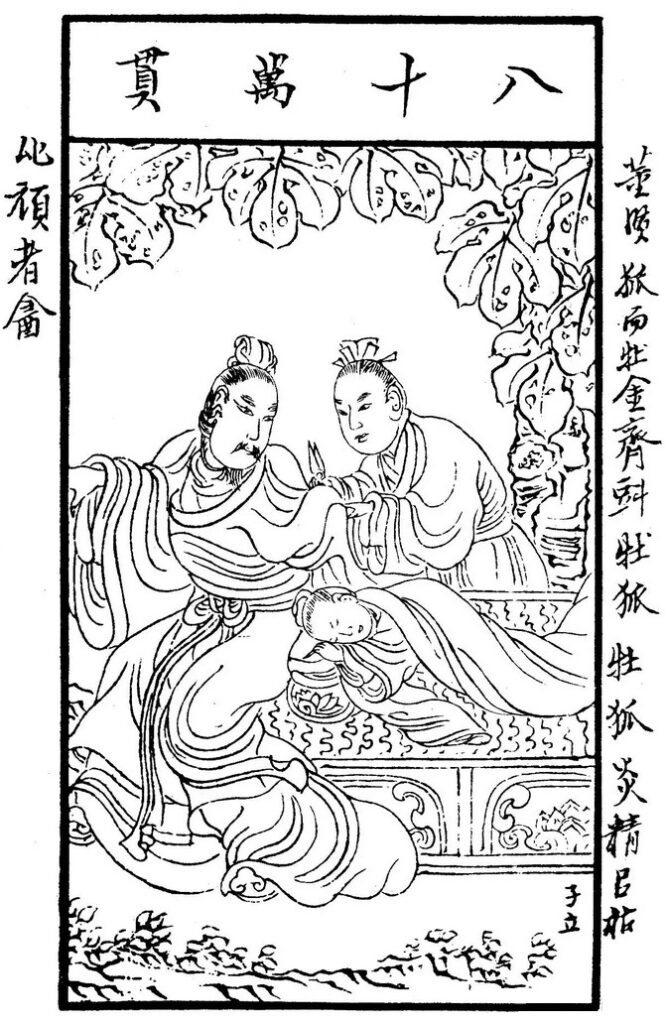The end of the Han dynasty (206 BCE – 220 CE) was a time of turmoil popularly known as the Three Kingdoms period, where rival warlords vied for hegemony as imperial power declined. War and famine led to an estimated seventy percent drop in total population by the beginning of the succeeding Jin dynasty, but despite this upheaval Han cultural mores persisted, including the acceptance and widespread practice of aristocratic same-sex intimacy. Historian Bret Hinsch has collected evidence of at least ten different Han emperors who openly engaged in same-sex relationships with a favoured courtier, showing that “not only was male love accepted, but it permeated the fabric of upper-class life”.

The infamous warlord Cao Cao, whose military might and strategy set the foundations for one of the three kingdoms, took a male lover by the name of Kong Gui. Their affair is shared in Pei Songzhi’s commentary on the Records of the Three Kingdoms (Sān Guó Zhì, written in the 3rd century CE), but can also be found in two encyclopedias, the Yìwén Lèijù (624 CE) and the Tàipíng Yùlǎn (983 CE). Volume three of the Records describes their relationship thus:
桂性便辟,曉博弈、蹹鞠,故太祖愛之,每在左右,出入隨從。
Kong Gui was full of flattery, skilled at playing chess and football, and so Cao Cao loved him. He was his constant companion, accompanying him on his comings and goings.
…
太祖旣愛桂
Cao Cao loved Kong Gui completely.
Male love is described in a similar way in another Han history. The notorious triad between the slave Qin Gong, his master Liang Ji and his wife Lady Shou is recounted in volume 34 of the Book of the Later Han (Hòu Hànshū):
冀愛監奴秦宮,官至太倉令,得出入壽所。
Liang Ji loved the slave Qin Gong, who was appointed Director of the Imperial Granary. He was able to enter and leave Lady Shou’s residence.
The two passages are very much alike in what terms they use to describe same-sex love. Comparing this to the previous passage about Cao Cao and Kong Gui, the same character 愛 (‘love’) is used to describe their affections, and 出入 (‘enter and leave’, ‘comings and goings’, ‘internal and external’) is a plausible euphemism in both texts (‘internal’ often referred to relations a man had with his wives, while ‘external’ implied relations with other men.)
The Records also mentions the following:
《魏略》以朗與孔桂俱在佞倖篇。
In the Weilüe both Qin Lang and Kong Gui are mentioned in the ‘Artful Favourites’ (nìngxìng) chapter.
The text mentioned here, the Weilüe (written sometime between 239 and 265), is now lost, but had an entire chapter detailing the same-sex lovers of various famous figures. Qin Lang was a military general and lover of Cao Rui, Cao Cao’s grandson. The term nìngxìng is unambiguously sexual in meaning and refers to men who won favour with a lord or Emperor as sexual or romantic partners.
Since we can clearly identify when same-sex love appears in the historical texts, and we know that male love was accepted and normalised, it is not surprising to find in the Records of the Three Kingdoms that Cao Cao, along with other Han nobles of his time, had a sex life which included both men and women. Later translations of the Records understate the relationship between the two men, preferring – intentionally or mistakenly – to interpret it as platonic. Kong Gui is not mentioned at all in Cao Cao’s English language biography (Imperial Warlord: A Biography of Cao Cao 155-220 AD). Uncovering these relationships is therefore important, as without a nuanced history of sexuality our otherwise robust understanding of this time period becomes diluted.
 Laurie Raye is an alumni of the Universities of Aberdeen and Oxford and a Fellow of the Royal Asiatic Society. They specialise in Buddhist literature and are currently compiling a complete English translation of Cao Cao’s extant poetry. They are also the Editor-in-Chief of the science fiction and fantasy magazine Gwyllion. They tweet from @ohmwu
Laurie Raye is an alumni of the Universities of Aberdeen and Oxford and a Fellow of the Royal Asiatic Society. They specialise in Buddhist literature and are currently compiling a complete English translation of Cao Cao’s extant poetry. They are also the Editor-in-Chief of the science fiction and fantasy magazine Gwyllion. They tweet from @ohmwu

NOTCHES: (re)marks on the history of sexuality is licensed under a Creative Commons Attribution-NonCommercial-NoDerivatives 4.0 International License.
Based on a work at www.notchesblog.com.
For permission to publish any NOTCHES post in whole or in part please contact the editors at NotchesBlog@gmail.com




